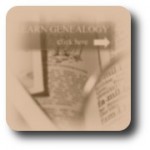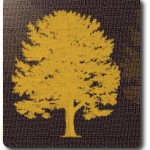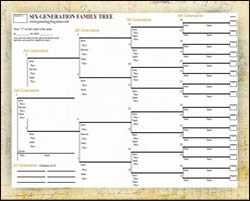Search results
Why Learn Genealogy?
April 27, 2012 by ramona
Filed under Articles, Getting Started in Genealogy, Introduction to Genealogy, Latest News
 Have you ever wondered why genealogy and family history research is so popular? What is it that drives people to spend so much of their money and time pursuing their ancestral past?
Have you ever wondered why genealogy and family history research is so popular? What is it that drives people to spend so much of their money and time pursuing their ancestral past?
On a personal level it may start with a question of self-identity “Who am I?” or a need to know where we belong “Where do I come from?”
In 1964 psychologist H. J. Sants, coined the term “Genealogical Bewilderment” in describing identity issues in adoptees, Sants theory declared that adopted children experienced a greater degree of stress than children raised by their genetic parents due to an absence of knowledge of their origins.
In 1952 a letter was written to the Journal of Mental Health by psychiatrist E. Wellisch, titled “Children without genealogy: The problem of adoption” in which he said:
“Knowledge of and definite relationship to his genealogy is … necessary for a child to build up his complete body image and world picture. It is an inalienable and entitled right of every person. There is an urge, a call, in everybody to follow and fulfill the tradition of his family, race, nation, and the religious community into which he was born. The loss of this tradition is a deprivation which may result in the stunting of emotional development.”
While not everyone who engages in genealogy as a hobby is suffering from an identity crisis, there is still an echo of truth in these words.
Perhaps we feel a little disengaged from the far off shores of our homelands or maybe the answer lies in the theory of ancestral memory as expressed by Carl Jung’s “collective unconscious”, Freud’s “archaic remnants” or the more modern idea of “genetic memory”. All theories which at their heart suggest that within each individual is a body of knowledge or a memory passed down through our ancestors.
Speculation and pseudoscience aside there is no doubt that genealogy has become a popular hobby. The most current report on market trends for genealogy by Global Industry Analysts, Inc. (statistics as of January 11, 2012) show that between US$1000 to US$18000 is spent per year on genealogy research by over 84 million genealogists.
Ultimately, the why of genealogy research can only be answered by the individual pursuing it and perhaps it is best left at that. However, one thing all of us addicted to climbing our family trees can agree on is that it is one of the most rewarding hobbies around.
If you are ready to begin learning about your family tree start here at Genealogy Beginner.
The Language of Genealogy: Understanding Old Documents
April 24, 2012 by ramona
Filed under Articles, Getting Started in Genealogy, Introduction to Genealogy, Latest News
 Today’s language is quite different from the daily language of our ancestors. Some words and their meanings have all but disappeared from the modern lexicon.
Today’s language is quite different from the daily language of our ancestors. Some words and their meanings have all but disappeared from the modern lexicon.
For the Genealogy Beginner this can make reading old documents confusing if not outright frustrating.
Archaic Genealogical References
Recently I was assisting a novice genealogist in transcribing a document from the 1600s that they had been working on for some time. A huge part of the problem they were facing stemmed from an unfamiliarity of the language of the times. To make it worse the unfamiliar words were written in an abbreviated form of the times.
Transcribing old documents can be difficult enough on its own. The addition of archaic words and abbreviations that have no meaning in modern language simply makes the process nearly impossible; especially while simultaneously struggling with a old script in an aged document.
In this case, the words that were causing the problem were “Umqhuille”, “Relict” and “Milner”. Umqhuille is a word meaning deceased and Relict means Widow.
Milner in this time was a merchant who dealt in small, fancy goods. While the modern meaning of the word has changed to mean a seller of hats, the etymology of the word derives from Milan, from where many of these goods were once imported.
From working out the words, we were able to:
- Asses that the ancestor in question was deceased at the time of a particular baptism
- Recognize that one person on the document –Relict – was his wife
- Understand what his profession was
From this information, we added an additional generation to the family tree as the Umqhulille and relict named were the grand parents of the individual being baptized. This transcription also helped track down both a Will and a Sassine, which led to a great deal more information on the family researched.
This purpose of this little story is to demonstrate the importance of becoming familiar with the language of our ancestors. It is more than likely that novice Family tree hunters will run across some common and not-so-common old words while digging for their roots. For this, A genealogical dictionary would be a very helpful tool to have on hand.
Join us on the Ask a Genealogist Forum for a list of links to some excellent resources for archaic words, old occupations, medical terms and more.
Genealogy News: Accessible Archives
February 29, 2012 by ramona
Filed under Articles, Latest News
 Accessible Archives has been a well-kept secret for far too long. The company founded in 1990 has made an impressive amount of archived information (at one time only offered through microfilm) available through computer technology.
Accessible Archives has been a well-kept secret for far too long. The company founded in 1990 has made an impressive amount of archived information (at one time only offered through microfilm) available through computer technology.
Accessible Archives has excellent search capacity that allows family history buffs to pinpoint very specific information that is then presented in digital format or through direct link.
Collections for Family History
This invaluable resource for genealogists contains mainly “PRIMARY SOURCE” materials! Filled with mostly US based content, Accessible Archives has a huge collection of newspapers and books from the 1700’s to 1800’s.
Some of the items in their collection that have the greatest genealogical value include:
- African American Newspapers
- Frederick Douglass’ Paper
- Freedom’s Journal
- Provincial Freeman (Canadian Publication)
- American County Histories to 1900
- Delaware and Maryland County Histories
Maine County Histories
New York County Histories
Vermont County Histories
- Delaware and Maryland County Histories
- The Civil War Collection
- Part I: A Newspaper Perspective
- Part II: The Soldiers’ Perspective
- Part III: The Generals’ Perspective
- Part IV: A Midwestern Perspective
- Part V: Iowa’s Perspective
- Part VI: Northeast Regimental Histories
Access for Genealogists
Access is available on a two-tier platform that includes institutions and individuals. For individual access, there is a yearly membership fee of $59.95 payable via internet by credit card, debit card or PayPal. However, before you sign up for Accessible Archives check with you local library, college or university as they may already have a membership.
In addition to Accessible Archives, amazing collection, the site hosts a news section, webinars and a blog filled with shared resources. Overall Genealogy Beginner gives Accessible Archives a very high rating as one of the best internet resources for family tree enthusiasts as well as historians.
Image Credit: Ramona Hartley
Family History and Food: Genealogy Beginner for Blog Action Day
October 16, 2011 by ramona
Filed under Articles, Genealogy for Beginners, Latest News
 Today is Blog Action Day and the subject is food. This year’s subject puts me in mind of how our gastronomic tastes and cooking practices have changed from those of our not so distant ancestors. Remembering some of the dishes grandma prepared makes me wonder if perhaps my forebears would have as poor an opinion of my food choices, as I have had of theirs. In my youth, dishes like Blood Pudding, Headcheese and Haggis would elicit a fight or flight response when encountered at the dinner table. Then again, only imagination can satisfy what Great, Great, Great Grandfather McCallum would have though of the mechanically deboned chicken nugget.
Today is Blog Action Day and the subject is food. This year’s subject puts me in mind of how our gastronomic tastes and cooking practices have changed from those of our not so distant ancestors. Remembering some of the dishes grandma prepared makes me wonder if perhaps my forebears would have as poor an opinion of my food choices, as I have had of theirs. In my youth, dishes like Blood Pudding, Headcheese and Haggis would elicit a fight or flight response when encountered at the dinner table. Then again, only imagination can satisfy what Great, Great, Great Grandfather McCallum would have though of the mechanically deboned chicken nugget.
Factors such as geography, availability and technology have unarguably contributed to a drastic change in diet and menu within the last 100 years.
Food and family history
The evolution of food from our distant and not so distant past to our modern kitchens can be a great source for family history stories. Enriching your families narrative with traditional recipes then and now in a cookbook, is a superb way to explore past generations. It is also a great way to preserve recipes and traditions for future generations.
Cook up some family stories
Writing on the subject of your families historic cookery does not have to be limited to recipes. Did you ever wonder what it was like to cook on a coal and wood stove, or think about what your life would be like without a refrigerator or microwave? Our forebears regularly grew gardens and raised animals for food. They hunted, fished and took advantage of nature’s bounty of wild berries, nuts and fruits. Unlike us, they did not have supermarkets and they certainly did not have access to modern food preservatives. Asking questions about how they prepared food to be stored over winter months, where they stored it and what types of containers they stored it in, are well worth including.
Wrap up
In these ordinary details of our past generations, we often find tales of courage and survival, not to mention healthy lifestyles. We are coming full circle and current trends such as the 100-mile diet, organic food and urban gardens, should alert us to the fact that we just might learn something from them.
Accessing Military Records
March 8, 2009 by Chris
Filed under Articles, Genealogy Military Records, Genealogy Records 101, General Tips
 The following came from a current subscriber to Genealogy Beginner.
The following came from a current subscriber to Genealogy Beginner.
“Great advice: First I would like to let you know I enjoy your tips. As a beginner they have been very helpful. I know different states have laws in reference to military records. In the state of South Carolina military records are not public. The information can only be given to the individual, their Power of Attorney, or spouse. The SC state statute is very clear and states that the military records can only be used for genealogical research 50 years after the death of the person whose military records are referenced. I know this to be a fact because I work in the office where the military records are recorded in Aiken County, South Carolina.”
We have to be very cautious as to who has access to these documents.
Where to Next? Blank Family Tree Template
Family Tree Confusion
December 9, 2008 by Chris
Filed under Articles, Blank Family Tree, Genealogy Reports and Charts, Introduction to Genealogy

A little while ago we talked about the fact that there are a lot of family tree templates available online. Many of them are extremely fancy and can be very confusing. These decorative templates are great for presentation purposes; however, most people are looking for a simple solution and don’t want to spend endless hours trying to understand this box or that branch. I thought I would take this opportunity to describe my approach here at Genealogy Beginner.
Continue reading “Family Tree Confusion” »
Rootschat
September 25, 2008 by Chris
Filed under Blank Family Tree, Genealogy Research Resources, Sharing Genealogy Information

Do your past generations hail from Scotland?
If they do, you will want to head straight over to the forums at Rootschat where there is a fantastic forum that will interest anyone doing Scottish research and it is so well organized that every county in Scotland has its own designated area.
Chris over at Scotland’s Greatest Story tells us that you can also find threads for practicing your Gaelic (Scottish and Irish).
We wouldn’t want you to miss this great site as it has a lot to offer a genealogy beginner digging up their Scott’s roots.
There are also wonderful resources for those interested in English, Welsh, Manx, Channel Islands and Irish history,
For more on this subject visit: Scottish Genealogy News and Events.
National Archives Hosts Free Genealogy Fair April 23, 2008
April 6, 2008 by Chris
Filed under Articles, Latest News, Public Records
 Write down this date and clear a space on your calendar! Wednesday, April 23, 2008. This is the date for the National Archives fourth annual Genealogy Fair. The highlights of this year’s program are the National Archives Federal records relating to the subject of general genealogy.
Write down this date and clear a space on your calendar! Wednesday, April 23, 2008. This is the date for the National Archives fourth annual Genealogy Fair. The highlights of this year’s program are the National Archives Federal records relating to the subject of general genealogy.
From the WWI and the Works Progress Administration there will be sessions offered in:
• Civil War pension files
• Freedmen’s Bureau marriage records
• World War I draft registration records
• New Deal publications
You will be in for a treat as the National Archives staff give demonstrations on the use of databases such as, Access to Archival Databases (ADD) and Archival Research Catalog (ARC). No matter if you are an experienced genealogist or a genealogy beginner the fair – which is free and open to the public – will provide guidance and information that you are bound to find of benefit to your future research efforts.
…
Where to Next?
Blank Family Tree with Step-by-Step Instructions
…
History of Genealogy
March 9, 2008 by Chris
Filed under Genealogy Research Resources, Getting Started, Sharing Genealogy Information
 In this great article, first published in the July/ August 1999 edition of Family Chronicle Magazine, Donna Porter-Phillips looks at the initial stages and development of genealogy as a hobby and professional practice. Ms. Porter-Phillips states that from the beginning, people have felt the need to leave a record of themselves. “Cave paintings in France, tombstone art all over the world, and even the petroglyphs and pictographs of Native Americans, all point to the fact that early man wanted to be remembered by those who would come after.
In this great article, first published in the July/ August 1999 edition of Family Chronicle Magazine, Donna Porter-Phillips looks at the initial stages and development of genealogy as a hobby and professional practice. Ms. Porter-Phillips states that from the beginning, people have felt the need to leave a record of themselves. “Cave paintings in France, tombstone art all over the world, and even the petroglyphs and pictographs of Native Americans, all point to the fact that early man wanted to be remembered by those who would come after.
She goes on to write:
“‘How far back does genealogy go?’ a beginner might ask. And at first thought, Biblical references might come to mind as evidenced by all the chapters of begats. Family descent was important to the ancient Hebrews, in part because Hebrew males had to prove descent from Aaron, the brother of Moses, in order to hold the Levitical priesthood. The first eight chapters of the book of I Chronicles give genealogies from Adam down through Abraham and other Old Testament patriarchs. I Chronicles 9:1 reads, “so all Israel were reckoned by genealogies…”
You can read the rest of the article by clicking here (and then clicking “How To Archives” > “History” > “History of Genealogy”). I suggest you take a close look at the magazine itself. You can pick up a free trial subscription if you’d like.
Hiring A Professional Genealogist
February 13, 2008 by Chris
Filed under Genealogy Research Resources, Getting Started, Making genealogy Connections; Reaching out
 I wanted to take a moment to recommend a great online article by Sue Morgan titled, “Hiring a Professional Genealogist.” The purpose of Genealogy Beginner is to help you get started with your genealogy search so you don’t have to hire someone. However, there will come a time when you need a helping hand. If you find this in a great librarian or good friend, fantastic. However, if you find yourself thinking it is time to call in the professionals you need to make sure you understand what is involved.
I wanted to take a moment to recommend a great online article by Sue Morgan titled, “Hiring a Professional Genealogist.” The purpose of Genealogy Beginner is to help you get started with your genealogy search so you don’t have to hire someone. However, there will come a time when you need a helping hand. If you find this in a great librarian or good friend, fantastic. However, if you find yourself thinking it is time to call in the professionals you need to make sure you understand what is involved.
In her article, Ms. Morgan outlines:
- What you can expect to receive for your money
- How long a search takes
- How much it will cost
- What the researcher will need to know when beginning work
You can read the full article by clicking here.
If you have used the services of a professional genealogist before, go ahead and leave us a comment below to offer some of your own advise.
…
Or Learn About How You Can Make Your Own Family Tree
Blank Family Tree with Step-by-Step Instructions
…
